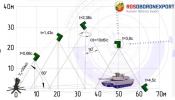Tank for a Franc? Swiss Weigh Fire Sale of Arms Over Debate on How to Help Ukraine
- Mothballed vehicles could replace tanks going to Ukraine
- Nature of Swiss neutrality shifting amid war in Europe
In a bunker in mountainous eastern Switzerland, nearly 100
Leopard 2 tanks have been mothballed for almost a decade, destined for decommissioning in the belief that armored warfare in Europe was a thing of the past.
Their
re-emergence into the public eye last weekend, following the announcement that Germany and other European states would send their tanks to Ukraine to defend against Russian attacks, has intensified a debate in the capital Bern about how and when the famously-neutral country can step up its own aid.
Shipping weapons directly to the battlefield is out of the question. But mainstream politicians are now calling for the Leopards to be sold for a nominal fee to Poland, Slovakia and the Czech Republic, replacing the tanks that their governments plan to send to Ukraine. On Thursday, Swiss MPs will debate a bill
gaining some traction in parliament that would allow Germany, Spain and Denmark to ship Swiss-made ammunition to the front as well.
“War has changed the discussion in Switzerland,” says Maja Riniker, a member of parliament from the centrist and pro-business FDP party, who introduced the proposal to give away the tanks. “We cannot abandon Swiss neutrality but we need to talk about what possibilities we have to support countries which stand for the same democratic values as Switzerland.”
Even if a decision on selling tanks isn’t imminent, a national debate about helping other countries to win a war in Europe would have been almost unthinkable in Switzerland a year ago. Germany’s
decision to break with an historical taboo and send Leopards to Ukraine, plus growing international criticism of the Swiss for
blocking arms shipments requested by allies, has triggered a shift in the popular mood.
Swiss Shift
In a recent poll, more than half the population broadly favored allowing re-exports of Swiss-made ammunition to help Ukraine’s war effort.
The 96 tanks stored in Switzerland would represent nearly a third of the 300 Ukrainian President Volodymr Zelenskiy says he needs to begin to turn the tide of the war with Russia. The vehicles were originally scheduled for sale in 2014 on the basis that they were surplus to requirements.
Any sale of the tanks would require a large-scale decommissioning and therefore also a resolution from parliament, a spokeswoman for the Swiss Defense Ministry said by email. So far, Switzerland has not received any request from Germany to sell back some of the tanks to manufacturer Rheinmetall AG, nor does it have any pending requests from other countries, she said.
The presence of so many redundant fighting vehicles underscores how heavily militarized landlocked Switzerland really is, and the importance of the arms industry. Weapons worth more than $800 million were shipped abroad in 2021, and military service is still mandatory despite its neutral status.
Tank for a Franc?
Riniker has called for the Leopard tanks to be formally decommissioned, and then sold for as little as one symbolic franc to Switzerland’s eastern neighbors, on condition that those tanks never actually then get re-exported to Ukraine. Switzerland doesn’t need all the tanks, she says, and even though her proposal was voted down on its first reading last week, she is keen to push the idea to a vote again this spring.
Some 65% of Swiss Arms Exports Go to Europe
...and Germany, Denmark and Romania account for more than half of that
“The war has changed the discussion in Switzerland in terms of what possibilities do we have within the very strict arms export law,” she says. “It looks like decommissioning these tanks could get a majority.”
The idea also has the support of the left-of-center party Gruenliberale. “The sale of decommissioned army materiel falls under the arms export regime, which means that there are no legal or political neutrality issues,” MP Melanie Mettler told newspaper NZZ. The socially conservative Die Mitte party has also signaled support, provided the tanks are sold at competitive prices.
Re-Exporting Swiss Ammo
The security policy committee of Parliament’s lower house last week
voted in favor of scrapping clauses Switzerland put into arms deals with other countries that prohibit them from re-exporting those munitions, provided the weapons are bound for Ukraine. In the upper house, lawmakers are
already working toward the same end.
The decision has been
called a “historic” shift away from Swiss neutrality, and comes almost a year after Switzerland surprised many and agreed to embrace European Union sanctions imposed on Vladimir Putin and other Russian political, business and military figures.
Still, the Swiss parliamentary process, built to serve the country’s tradition of consensus-building, takes time and is peppered with uncertainties for both bills. Thomas Aeschi, the party whip of the conservative SVP which is the largest single party in Swiss parliament, said it will reject both motions.
“We will block all efforts which violate Swiss neutrality,” he said.















